HOUSING
Opportunities

RISK AND ACCESS
Analysing OSFI’s loan-toincome limit p.16
BARE TRUSTS
Reporting requirements you need to know p.26
2024 BUDGET
Proposals

















Opportunities

Analysing OSFI’s loan-toincome limit p.16
Reporting requirements you need to know p.26
Proposals
















cus tom mor tgage solutions your client s require.
cus tom mor tgage solutions your client s require
We
We provide a broad range of residential 1s t and 2nd mor tgages tailored to the needs of your self- employed, stated income, and low beacon
client s . Fur thermore, a common sense lending approach allows us to approve and fund deals fas t.
• Re sidential Mor tgages
• LT V Sliding Scale of 6 0% on the balance
• O PEN Terms Standard
client s Fur thermore, a common sense lending approach allows us to approve and fund deals fas t. • Re sidential Mor tgages • LT V Sliding Scale of 6 0% on the balance • O PEN Terms Standard • B C , Alber ta and Ontario
• B C , Alber ta and Ontario
applicati o ns @ a n t r imi n v e st m ents c o m
P r i v a t e L e n d e r – F ilogix, Vel o ci t y a n d L
P r i v a t e L e n d e r – F ilogix, Vel o ci t y a n d L e n des k










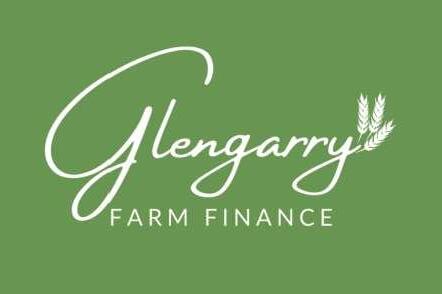

VOLUME 9 ISSUE 2 SPRING 2024
THE CANADIAN MORTGAGE BROKERS ASSOCIATION
DIRECTORS
Terry Kilakos (CMBA-Quebec)
Jim DeCoste (CMBA-Atlantic)
Deb White (CMBA-BC)
Taylor Lewis (CMBA-Ontario)
EXECUTIVE DIRECTOR
Carla Giles
CMBA - ATLANTIC
Mortgage Brokers Association of Atlantic Canada
12 M - 7095 Chebucto Road, Halifax, NS B3L 0A1
CMBA - BC
Mortgage Brokers Association of British Columbia 2025 Willingdon Ave, Suite 900, Burnaby, BC, V5C 0J3
CMBA - ONTARIO
Independent Mortgage Brokers Association of Ontario
7 - 40 Winges Road, Woodbridge, ON L4L 6B2
CMBA - QUEBEC L'Association des courtiers hypothecaires du Québec
5855 Taschereau #202, Brossard, QC J4Z 1A5
CANADIAN MORTGAGE BROKER magazine is produced by the Canadian Mortgage Brokers Association (CMBA National)
EDITOR
Carla Giles
STAFF WRITER
Ray Basi
MANAGING EDITOR
Kathleen Freimond
ART DIRECTOR
Scott Laing
BILLING AND SALES
Debra Hiller
CONTRIBUTORS
Malcolm Aboud
Ray Basi
Tara Benham
Emilie Dillon
Carla Giles
Lisa Gordon
Taylor Lewis
IMAGES Adobe iStock
CANADIAN MORTGAGE BROKER © All rights reserved. The views expressed in CANADIAN MORTGAGE BROKER are those of the respective contributors and are not necessarily those of the publisher or staff.
PUBLICATIONS MAIL AGREEMENT 41297283
Please return undeliverable Canadian addresses to 900-2025 Willingdon Ave., Burnaby, BC V5C 0J3
Printed in Canada by Hemlock Printers Ltd.


Canada's housing market stands at a crossroads, grappling with multifaceted challenges that further impact affordability and accessibility.
In the federal budget 2024, tabled by Deputy Prime Minister and Federal Finance Minister Chrystia Freeland, significant investments were outlined in three key areas: housing, health and defence.
Regarding housing, the federal government intends to build 3.87 million homes by 2031 through a series of tax breaks, incentives and loans. To achieve this target, housing starts will need to ramp up significantly to an average of 550,000 per year, almost double the current pace.
Housing measures include a $6-billion infrastructure program, a $400-million top-up of the already operational housing accelerator fund, and a $15-billion expansion of the apartment construction loan program. Additionally, $600 million has been committed to a series of homebuilding innovation efforts aimed at scaling up modular and prefabricated homes. The government will also sell off underused federal properties for building rentals, finding savings of $3.9 billion over 10 years.
While initiatives like leveraging surplus federal land and extending amortization periods for first-time homebuyers purchasing new builds hold promise, their tangible impact may take years, and it only addresses a fraction of Canadians seeking housing solutions.
To offset increased spending, a series of new tax measures are on the horizon, impacting personal and corporate financial status. Notably, there is an increase in the capital gains inclusion rate, slated to rise from 50 per cent to
This is an opportune moment to broaden the influence and empower the mortgage broker channel, recognizing and leveraging the expertise of brokers to guide Canadians through the complexity of mortgage financing.
67 per cent for incomes surpassing $250,000, set to take effect come June 2024. Projections suggest this change will yield a substantial boost in tax revenue, estimated at $19.4 billion over the span of five years.
While investing in housing is necessary, the way the government has found to fund this investment may have negative effects on the economy. Some of the revenue measures may hinder business investment, a crucial factor in improving productivity and boosting entrepreneurship. It's worth noting that Canada already imposes the highest corporate profit tax among the G7 economies.
Moreover, there is a concern that increased business costs may trickle down to consumers, impacting standards of living and exacerbating affordability issues in the medium term.
The housing market is currently experiencing a decline of over 30 per cent compared to long-term averages. According to the Canadian Real Estate Association (CREA), there were 3.8 months of inventory on a national basis at the end of March 2024, which remains unchanged from the end of February. Typically, the long-term average sits at about five months of inventory.
Dwindling inventory levels leave the housing market vulnerable to significant price fluctuations. Experts caution that without a swift increase in construction, price surges appear inevitable due to the lack of a balanced market to absorb renewed demand.
This highlights the critical need for co-ordinated action to stabilize home values and tackle the pressing affordability and housing challenges facing Canadians. Collaboration between federal and provincial governments is vital to ensure effective implementation and prevent bureaucratic obstacles.
Additionally, the private sector's pivotal role in driving progress forward cannot be overstated. Addressing housing supply shortages hinges on favourable economic conditions, encompassing not only availability of skilled construction labour but also access to financing, and streamlined regulatory processes. Investment in technology and equipment further enhances construction efficiency and productivity.
As the housing market continues to grapple with supply constraints and affordability challenges, nearly 40 per cent of mortgages are set to reset at higher rates within the next two years.
Despite prevailing uncertainties, there is a sense of cautious optimism within the mortgage industry with expectations of interest rate changes and their potential impact on market dynamics.
The latest quarterly forecast from CREA indicates a surge in sales towards the end of March, along with a significant increase in listings at the beginning of April, suggesting the market may be gearing up.
CREA’s forecast for 2024 predicts a 10.5 per cent increase in residential property transactions compared to 2023, with the national average home price expected to rise by 4.9 per cent to $710,468. Additionally, national home sales are projected to increase by 7.8 per cent to 530,494 units in 2025, driven by the expectation of declining interest rates approaching more normal levels.
Given the current realities, expanding the mortgage broker channel emerges as a crucial piece of the puzzle in supporting homeownership in Canada and safeguarding consumers. Brokers offer invaluable assistance in navigating the ever-shifting landscape of mortgage options, ensuring that buyers make informed decisions aligned with their financial objectives.
Brokers are uniquely positioned to capitalize on emerging opportunities, leveraging their expertise to guide clients through the complexities of the evolving housing landscape.
Growing and empowering the mortgage broker channel plays a crucial role in supporting homebuyers and fostering homeownership in Canada. By expanding the reach of the broker channel, more Canadians gain access to professional assistance in securing suitable mortgage options tailored to their financial needs and goals. Empowering brokers enhances consumer choice and ensures that buyers make informed decisions, ultimately promoting financial literacy and responsible borrowing practices.
Moving forward, Canada's housing market requires a focused approach that prioritizes affordability, supports investment and productivity gains in construction, and fosters sustainable growth. This is an opportune moment to broaden the influence and empower the mortgage broker channel, recognizing and leveraging the expertise of brokers to guide Canadians through the complexity of mortgage financing.

























Your clients are a married couple buying their first home. As is common in today’s market, they are receiving a substantial financial contribution from parents of one of the spouses to finance the purchase. The lender required, and the parents provided, a gift letter, but you are unsure whether the parents truly intend a gift. Is the gift letter determinative as to the reason for the parents advancing the money? If the couple later divorces, can you do something to avoid them having to litigate whether the advance was an equity investment by the parents in the home rather than a loan or a gift? What inquiries should you make and what steps might you consider?

Still waiting for Bank Approvals?
Stress Test killing your deals?
Your clients need you now, more than ever as the banks are tightening up! We offer 24 Hour turnaround on commitments – allowing you to present solutions for your clients sooner rather than later.
Equity Lending up to 1,500,000 1st and 2nd Mortgages
Purchase / Refinance, ETO up to 75% LTV
Special offers for 600+ Beacon Scores in large urban centres
The case of 672047 B.C. Ltd. v Johal, 2023 BCSC 2261 (CanLII) is a good reminder of the issues that arise and the approach the courts take to resolving them.
A couple made an accepted offer to purchase a property. They would be receiving $500,000 from the husband’s father toward the purchase. The lender they intended to use required a standard gift letter to be signed regarding the funds. The three parties signed the letter and certified that the funds are a genuine gift from the donor and do not ever have to be repaid, no part of the financial gift is being provided by any third party having any interest (direct or indirect) in the sale of the subject property, and the donor(s) is an immediate family member. The father signed the gift letter after receiving advice from a lawyer and all three signed the gift letter in front of the same lawyer. That prospective purchase fell through.
As part of their continued search for a home to purchase, the couple obtained conditional approval for a mortgage. As part of the process to obtain the conditional approval, the father and son provided a letter from their accountant to the son’s mortgage broker that the father’s company was gifting $500,000 to the son. This lender too required a gift letter to be signed, albeit in different language but to the same effect as the first gift letter. On the same day the gift letter was signed, the father gave his son a bank draft for the funds and the son deposited them to his own account.
About two months later the couple purchased a home, with only the two of them being registered on title. It was purchased with the $500,000 from the father together with financing the couple obtained using the second gift letter.
About eight and a half years later the couple separated, and the son moved out of the purchased home. About 18 months later, the son advised the daughter-in-law that the loan would need to be returned to his father, and the father indicated he wanted his funds returned from the sale of the home.
This presumes that a trust, not a gift, is intended when a parent gratuitously transfers funds to an adult child. The presumption is that the child is holding those funds for the benefit of the parent. That presumption arises here: the father transferred the $500,000 to his adult son gratuitously. It then falls on the party claiming the transfer as a gift to produce evidence that on the balance of probabilities proves that the transferring parent, at the time of the transfer, intended a gift.
Because (other than the gift letters) there was little documentation created at the time of the funds being transferred to determine the gift, loan, investment issue, the Court was left to sift through the conflicting evidence to determine whose version was to be believed.
home. Nor was there any evidence that he had told anyone else that was the purpose of him advancing the funds. This is particularly significant as the gift letters state the opposite intention at the time of the advance being made. As well, the father’s claim of the funds having been advanced as an equity investment in the home is inconsistent with him: having advanced the funds before any offer on the home had been made, not visiting the property until after the couple took possession, and not sharing in the expenses associated with the property such as property taxes and maintenance.
The presumption is rebutted and the advanced monies were not an equity investment in the home.
The evidence did not support that the father (his company) transferred the funds to obtain an interest in the purchased home. He admitted he had not told the couple until the Court proceedings of an intention on his part that the money was advanced as an investment in the
That leaves the court to determine whether the funds were advanced as a loan or a gift. Again, the law presumes that they were not intended as a gift. The key inquiry is to determine the father’s intent at the time the transfer was made. Only the intent of the person making the transfer is relevant; it matters not what the intention is of the person receiving the transfer. The following is a consideration of some of the factors courts consider to determine whether the funds were advanced as a loan versus a gift.
I SHOULD HAVE BEEN MORE CLEAR!
… the existence of a gift letter prepared by a parent to assist a child in obtaining mortgage financing is not determinative of the parent’s intent in advancing funds; it does not necessarily negate the intention to grant a loan …
There were no documents contemporaneous with the advance being made that the father intended a loan. When he made loans to his son in business in the past, he had marked “loan” on the cheque or bank draft. As well, here the funds were advanced contemporaneously with the gift letter. There was neither contemporaneous documentation nor conversation to counter the intention of a gift stated in the contemporaneous gift letter.
No manner for repayment was specified. There was no discussion regarding repayment during the course of the marriage. Had repayment been expected, it would have been discussed before the court case was commenced.
There is no security held for the loan. The father took no steps to be registered on title nor to obtain security for the funds advanced.
Although generally considered in cases on this topic, this is not a case of an advance having been made to one child and not others, or advances of unequal amounts having been made to various children. The son is an only child and the sole beneficiary of the father’s estate.
No demand has been made for repayment.
No partial repayment has been made, although the son had profits from which to do so.
There is no evidence that the father had an expectation of repayment at the time the funds were advanced.
The evidence as a whole led the court to find that the father at the time he advanced the funds intended a gift and not a loan. The law presumes a loan, but that presumption is rebutted by the evidence in this case.




Parents who advance children funds to purchase real estate should make their intention known at the time they are making the advance. This can be done, for example, by a short letter or note stating the intention. Ideally, it should be signed as received by those children (and in-law children) receiving the funds.
A gift letter is not determinative of the parent’s intent in advancing funds; it does not necessarily negate the intention of the parent to grant a loan.
A mortgage broker who does not want to get involved in such matters could assist their clients to avoid a possible messy and expensive problem down the road by alerting them to the issue. A more involved broker might help paper the relevant intention. Either way, such service can contribute to building a loyal client base.
This article is not intended as legal advice. You are advised to obtain legal advice in specific instances.









A chance encounter prompted Jim DeCoste to join the mortgage industry 17 years ago. Today, he leverages lifelong learning to help clients find financial solutions in a challenging market. BY LISA GORDON
Right before Jim DeCoste was scheduled to speak with Canadian Mortgage Broker for this article, his phone rang. On the other end of the line was a referral client, someone who had heard that DeCoste might be able to offer some solutions for an upcoming mortgage renewal.
That kind of call is nothing new for DeCoste, owner and principal broker at Dominion Lending Centres Maritime Mortgage Group in New Glasgow, N.S.
“When you get a referral, you know you’ve done a good job for somebody,” said DeCoste, who is also the president of CMBA Atlantic. “We have 14 brokers across Nova Scotia and New Brunswick, and we assist sometimes in Prince Edward Island. A big part of our business is past and current clients.”
Born and bred in Antigonish, N.S., DeCoste trained as a millwright and worked in the trade for a few years before he was laid off. In 1997, he landed a job as an insurance company advisor before advancing into hiring and training. Finding his work-related travel excessive, DeCoste decided to launch his own financial advising firm.
One day in 2007, a client happened to ask him if he knew any mortgage brokers.
“At that time, it didn’t seem like mortgage brokers were as popular,” recalled DeCoste. “I looked into it and found that I could add a mortgage broker licence to my financial advisor licence. There was a local Dominion Lending franchise about 35 minutes away, and I ended up joining them.”
By 2010, DeCoste had purchased the franchise and found himself wearing the many hats of a small business owner – bringing on new brokers to grow the client base, while maintaining the existing book of business.
“We are fortunate from when we got into the industry that we have a good client base,” he said. “Our market is not overly saturated with brokers, either.”
As he reflected on his career, DeCoste said he has always realized the importance of helping people find financial solutions, even in the most difficult situations.
“I like the challenge of mortgage brokering. It’s not always an easy deal coming across your desk. So, it’s about trying to find solutions for clients who don’t understand or need help to navigate the process – like new homebuyers, or even more established clients who may need help. I like taking on that challenge and putting a plan together to get it done. At the end, there’s the reward of your client’s appreciation.”
One of his own challenges has been keeping up with what feels like constant change in the mortgage industry. Lifelong learning is a must for mortgage professionals, according to DeCoste.
“New lenders come in offering certain products, and government regulations and changes are constant,” he explained. “We just saw the return of the 30-year amortization, for example. You have to keep up on those changes and jump on lender webinars to learn about their products and processes. If you’re not keeping up to date on those things, you can’t help your client.”
“Become an expert in products, take the time to understand the different lender guidelines, and stay up to date on government regulations. If you’re not working on a deal, then be networking for yourself or take the time to learn more.

DeCoste added that bringing new brokers up to speed on industry products and processes is a time-consuming process at his brokerage.
Still, being current on industry developments is the key to offering clients the best solutions. At Christmas time a few years ago, DeCoste was contacted by a client whose property was subject to foreclosure. The banks could not help her. But DeCoste had made contact with a local private lender, and he was able to put together a one-year plan so the client could keep her home. From there, he helped her move to an alternative lender, and then finally to an A lender.
“That’s the biggest lesson I’ve learned in this business: You have to put the time in to keep yourself educated,” he emphasized. “Become an expert in products, take the time to understand the different lender guidelines, and stay up to date on government regulations. If you’re not working on a deal, then be networking for yourself or take the time to learn more. New brokers, especially, should spend a couple of hours a day doing their research.”
Commenting on the East Coast mortgage market, DeCoste said the region is facing similar challenges to the rest of Canada. Housing supply is scarce due to relocations from other provinces and immigration from outside Canada.
“The other challenge we’re seeing is a lot of people will be needing assistance,” he added. “The cost of living has increased a lot and isn’t slowing down. On top of that, with high interest rates for renewals, we will see more people needing assistance from brokers. It is a great opportunity to reach out to clients who are renewing a mortgage or who need to restructure debt. It’s a good time to be a broker.”
From the beginning of his career, DeCoste has felt it’s important to do the right thing – simply because it’s the right thing to do.
“Being able to help people is excellent, but if you find yourself in a situation, and let’s say you could get it done for the client but they may not be in a better situation – is that really best for them? If you keep that in the back of your mind about doing the right thing, it is good for the industry itself.”
Finally, DeCoste encouraged Canadian mortgage brokers to get involved with CMBA.
“Be a part of your association. I got involved because I thought it was important. It’s a career choice for me, and I don’t see this as just a job. If you want to see positive changes, whether internally or in government, get involved.”

As of next year the Office of the Superintendent of Financial Institutions (OSFI) is bringing in a loan-to-income (LTI) limit. This will be in addition to other measures already in place including the B-20 Guidelines and the minimum qualifying rate (MQR) for uninsured mortgages. These measures apply to financial institutions within OSFI’s jurisdiction, federally regulated financial institutions (FRFIs).
Each measure does indeed make the marketplace more stable in the sense of keeping unqualified or marginally qualified would-be borrowers from entering it. However, unless the correct balance is maintained, by avoiding that harm another is created. That other harm being denying access to borrowers who qualify in reality but who cannot meet the artificially enhanced barriers put in front of them.
We will look at OSFI’s recent announcement of the new LTI limit to be implemented and the MQR for uninsured mortgages. Decide for yourself if OSFI has struck the right balance, undershot the target, or overshot the target.
OSFI announced it will be implementing an LTI limit on new uninsured mortgage loans. The LTI measure is expected to take effect from each institution’s fiscal Q1, 2025, with quarterly compliance reporting required thereafter.
Following are some key points:
n The LTI limit is intended to restrict high levels of household debt across each FRFI’s uninsured mortgage loan portfolio. Each FRFI will be assigned a tailored excess threshold limit based on their competitive model. Limits will be derived using a consistent, principle-based approach considering historical trends and recent origination trends. The limit will not apply to individual borrowers, instead it will limit the percentage of mortgages in an individual FRFI’s portfolio that can exceed the LTI limit. The measure is intended to protect depositors, policyholders, and FRFI creditors.
n The proposed framework will assess the portion of new loans exceeding a 4.5x loan to income multiple on a quarterly basis. All loans secured against a property, regardless of the FRFI or intended use, will be in scope; however, insured loans and renewals will be excluded.

n The measure will serve as a backstop to the MQR, especially in low interest rate periods. The purpose is to prevent high household debt, which poses risks to credit, safety, and the stability of the financial system.
OSFI published a consultative document in January 2023 seeking feedback on mortgage lending risks, particularly debt serviceability. OSFI indicates that based on consultation feedback, it changed its approach from a uniform LTI restriction to a more nuanced, individual FRFI-level approach.
The MQR for uninsured mortgages is the greater of the mortgage contract rate plus the buffer and the mortgage contract rate plus the floor.
n The buffer is a safety margin that requires borrowers to have the ability to absorb some negative impacts to their finances. Since December 12, 2022, the buffer has been set at 2%.
n The floor accounts for risks that can emerge from changes in the broader economy. Since December 12, 2022, the floor has been set at 5.25.
OSFI indicates it bases the MQR on data gained from monitoring Canada’s financial institutions, a range of vulnerability indicators in the housing market and the economic environment, and consulting with the Department of Finance Canada and the Bank of Canada. They review and publish the MQR for uninsured mortgages at least every December.
OSFI considers this mortgage stress test to be essential to ensure borrowers can still make payments if they experience negative financial shocks such as, but not limited to, a reduction in income, an increase in mortgage interest rates, or an increase in household expenses.
On the bigger scale, OSFI considers mortgages to be one of the biggest risks for financial institutions. Their purpose for qualifying borrowers at a higher interest rate than the actual rate they have agreed to with
their lender is to ensure lenders remain careful with their lending practices. The concern being that defaults on mortgages can have a negative impact on Canada’s financial system.
Certainly it is not difficult to appreciate the perspective from which OSFI is approaching the risk mortgages present to the financial sector, particularly given its oversight role regarding FRFIs and a good part of the insurance space is occupied by a government entity. That said, one can only hope they strike the correct balance between ensuring the safety of the marketplace and maintaining appropriate access to it. Housing is a fundamental need – the availability of mortgages plays a critical role in determining how available it is to individual consumers.
This article is not intended as legal advice. You are advised to obtain legal advice in specific instances.
Right: Lowell Harding (left) introduces some of the golfers taking part in the annual tourament (from second left) Peter McGrath, Jenny Hawes and Mark Golbey.
Far right: Sunset Ranch Golf Course near Kelowna.
Since 2016, the Okanagan Mortgage Broker Invitational Golf Tournament has raised $90,000 for Kelowna General Hospital’s Neonatal Intensive Care Unit
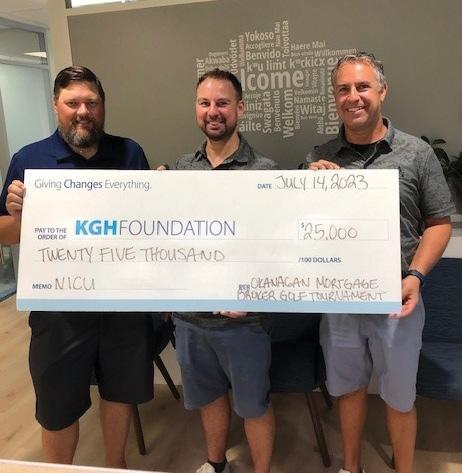 BY LISA GORDON
BY LISA GORDON
For three British Columbian mortgage professionals the Kelowna General Hospital’s Neonatal Intensive Care Unit (KGH NICU) is a special place that cared for their newborn children.
That’s why Mark Golbey, Lowell Harding and Peter McGrath joined forces back in 2016 to launch the Okanagan Mortgage Broker Invitational Golf Tournament, a charity event that so far has raised a total of $90,000 for the neonatal unit. Although the cause is great, the tournament is also designed to bring the mortgage industry together for some fun on the links.
“I have a background in event planning,” explained Golbey, who works at Indi Mortgage in Kelowna. “Peter McGrath (who also works at Indi)
and I decided to do an event just for fun. We’re in the Okanagan and golf is huge here, so we thought we’d put on a tournament.”
Their friend and fellow mortgage professional, Lowell Harding of Tango Financial, joined forces with them.
The three friends selected the KGH NICU as their charitable cause after experiencing the quality care it provides firsthand. In 2021/2022, the neonatal unit cared for 358 babies who spent at least some time in the NICU, with the average stay lasting 10.8 days.
Far right: Enjoying a fun day of golf and raising funds for a good cause are (from left) Lisa West, Marcy Koopmans, Lee-Ann McEllister and Cluny Coghlan.




“We saw how much they needed, and the costs involved,” said Golbey. “We thought we should do something to give back. The first couple of tournament years were small, with our broker and lender friends, and then we thought we should make this bigger and better – let’s turn it into an industry-wide event instead of company-specific. It made sense to open it up to everyone.”
The 2024 event will see about 132 golfers teeing off in the best ball tournament, set for June 7 at Sunset Ranch Golf Course in Kelowna. This is the first year that organizers didn’t have to pursue sponsorships. Instead, sponsors came to them and sponsorships were sold out by mid-April. Next, they will concentrate on filling the foursomes – which are purchased by lenders who then find brokers to play.
“We try to keep it fun and include everyone, even if they’re not golfers,” said McGrath. “Sunset Ranch offers some challenges but it’s fairly forgiving and wide open. Plus, they are used to catering to large groups.”
The rain-or-shine tournament hasn’t always had the best weather. One year, golfers were rained out after 10 holes – but still walked away saying it was one of their favourite events.
This year, local cover band Rann Berry’s Time Machine will be performing at the tournament. It’s the first time live music has been included.
“We try to keep the costs in check for a small firm or brokerage,” said McGrath. “We pride ourselves in having good prizes; and, of course, the main goal is to get as much as we can for the NICU.”
In 2023, the tournament raised $25,000, and the three organizers are hoping for a similar amount this year. A single breastfeeding chair for the NICU costs $50,000 – proceeds from a previous event went towards that purchase.
“We have a silent auction component, too. If people would like to support that, we’re always looking for auction donations and items,” said Golbey.
Word has spread about the tournament, with some golfers coming in from other parts of Canada. The opportunity for industry camaraderie is welcome in the Kelowna area.
“For me, it’s about getting everyone together,” said Harding. “I love that the charity element is there; but in the Okanagan, there aren’t a lot of local industry events. Sometimes, we feel like we’re on a bit of an island here.”
Below right:
Dean Larson and Kyle Williams brought a touch of Hawaii to the annual fundraiser for Kelowna General Hospital’s Neonatal Intensive Care Unit.

He said lenders want to get in front of the local broker channel, and the golf tournament gives them a good chance to do so.
With the countdown on for the 2024 Okanagan Mortgage Broker Invitational Golf Tournament, the three organizers had some advice for other mortgage professionals looking to organize something similar.
“Keep doing it until it becomes successful,” advised Harding. “You’re not going to be successful in year one, but you can’t give up.”
There’s also something to be said for working with friends to make an event happen.
“Do it with your buddies,” said Golbey. “The three of us work for different companies, but we’re really good friends, so this gives us an excuse to sit on a patio and discuss the event.”
Added McGrath: “This is an industry that affords us the time to do these types of events, and we are lucky to be here and that everyone comes together.”
Looking for more info on the Okanagan Mortgage Broker Invitational Golf Tournament? Email Mark Golbey at mark@markgolbey.com

HVI Appraisal now o ers national coverage with our network of Top Dog Appraisal Firms
The only portal you need for mortgage appraisals for MICs, Private or Alternative Lenders. Top Dog member rms are Alternative Lender approved and located in all major centres from Abbotsford, BC to Yarmouth, NS.
Appraisal orders can be placed at any time and are updated as soon as their status changes. Customers are noti ed via email and/or SMS and can always check the status and history within their account.
Brokers can earn points for each order they place and have completed. Grow your points and redeem them for digital gift cards, charitable donations, or discounts on active applicant invoices.
Don’t have an hviorder.ca account? Sign up in seconds and place orders on the easyto-use appraisal portal. Stay on top of your business from start to nish with the best Alternative Lender approved appraisal rms in all major markets from coast to coast.



How to identify an equitable mortgage and when to obtain or recommend legal advice
BY RAY BASI, J.D., LL.B., DIRECTOR OF EDUCATION FOR CMBA-BC AND MBIBChat is an equitable mortgage and why should a mortgage broker care to know?
No doubt, a mortgage broker who lends their own money (lender broker) will need to engage a lawyer to pursue an equitable mortgage and mortgage brokers who represent borrower and/or lender (intermediary brokers) need not advise their client extensively on the topic, however both should be equipped to recognize the issues. This will enable a lender broker to more effectively obtain legal advice and an intermediary broker can be appreciated as a better and more complete advisor in appropriately recommending obtaining legal advice to their client.
An equitable mortgage is but a type of mortgage. As with a legal (meaning registered) mortgage, it provides security for a borrower’s/debtor’s promise to:
n abide by a loan agreement, including requirements as to payments, keeping the property insured, keeping property taxes paid, and maintain the property in an appropriate state of repair;
n pay an existing debt owed to a creditor, or
n pay the debt of a third party if the third party does not pay it (a guarantee).
As with a legal mortgage, if the borrower/debtor does not keep the promise, the lender/creditor can utilize legal processes to have the security property sold or foreclosed upon.
A legal mortgage occurs because the parties agreed to the terms of the loan and that the agreement would be registered as a charge against the title to the security property. Also, given that the written agreement met the land title office requirements as to content and formalities (such as meeting the requirements as to how signatures are to be witnessed), it was accepted for registration.
An equitable mortgage also occurs because the parties expressed a common intention for the lender/ creditor to have a mortgage over the subject real estate. However, they arise because of the additional factor that:
1. the borrower/debtor agreed to provide a registrable mortgage on the demand of the lender/creditor;
2. the document is in the process of becoming registered as a legal mortgage;
3. the borrower/creditor has provided the Duplicate Certificate of Title from the Land Title Office to the lender/creditor as security; or
4. the document, while intended by both parties to be a registered
A well-rounded broker should be able to identify the issue or the possibilities and turn to obtaining or recommending legal advice.
An equitable mortgage can go some distance in protecting the debt owed to the lender broker themself or to the broker’s client.
mortgage, is not registerable because of a defect as to a registration requirement (such as a signature is not witnessed in the manner required for registration).
Circumstances noted in (1) to (3) involve conscious decisions by the parties in structuring the transaction. Mortgage brokers rarely structure matters in these ways and those that consider doing so are advised to involve a legal advisor from the outset.
Circumstance (4) however involves a mortgage document that was intended by the parties to be a legal mortgage but cannot be registered due to an unintended defect in the document. Such a mortgage may be valid as an equitable mortgage.
Priorities refers to the order in which charges against title are entitled to be paid. The general rule in determining priorities is ‘first in time, first in line’, meaning that an earlier registered charge has priority over a later registered charge.
Courts have generally accepted the following in determining priorities concerning equitable mortgages:
1. Persons who take steps after having notice of a prior charge do so subject to the prior charge.
2. Registration is deemed to be notice of the charge to the world. Everyone is presumed to have notice of a registered document, even if they do not have actual notice of it.
3. Anyone who has actual notice of an unregistered mortgage has sufficient notice of it.
4. Parties to a mortgage are bound by it even if it is not registered, presumably because they undoubtedly have notice of it. As between two equitable mortgages, the earlier of the two has priority. As between a first legal mortgage and a second equitable mortgage, the first mortgage has priority. As between a first equitable
mortgage and a second legal mortgage, the second mortgage has priority if the lender has acquired the legal mortgage in good faith for value and without notice.
This approach to determining priorities makes it obvious why lenders overwhelmingly prefer registered mortgages. They generally provide better security for the lender.
When a borrower is not cooperative in correcting a deficiency preventing a mortgage from being registered, the lender has the option of starting a court action, registering notice of the court action on title, proving the equitable mortgage in court, obtaining a court order, and then registering the mortgage against title. This is not the place to set out the process in detail and nor does a broker need to know it to that degree. It is enough for the broker to recognize the issues and obtain or recommend the client obtain legal advice, as the case may be.
Broker lenders might also ensure that their mortgage contains an obligation for the borrower to fully cooperate to correct any deficiencies for registration.
In Greenspan v. Van Clieaf, 2023 ONCA 681 (CanLII), the lender extended two loans to the borrower. The first was for $250,000 and secured by a registered third mortgage. The second loan was for $125,000, was not registered, and had a maturity date of 30 days from funding. If a promissory note was not repaid within 30 days after the maturity date, the parties agreed the lender would register a fourth mortgage against the property.
The borrower defaulted on both loans. No fourth mortgage was ever registered. Instead, other creditors of the borrower had obtained judgement and registered a writ of execution against the property.

The subject property was not owned by the borrower until two years after the
In Wang v Guo, 2024 BCSC 380 (CanLII) the BC Supreme Court declined to decide there was an equitable mortgage where the language in an indemnity clause of a project management agreement was too vague. The terms of the indemnity agreement provided that Guo assumed “full responsibility” for any losses the plaintiffs suffer by his misconduct and he agrees to compensate [Wang] and “guarantee it by using all [his] assets.”
The agreement did not adequately specify the assets pledged to secure the guarantee. The agreement need not have specifically described the property if it could otherwise sufficiently be ascertained or ascertainable as to whether it was to be secured. The Court decided against there being an equitable
Brokers are not going to face equitable mortgages on a day-to-day basis. However, when the topic does arise, it can involve substantial amounts of money. A well-rounded broker should be able to identify the issue or the possibilities and know to, as may be appropriate in the circumstances, themself obtain legal advice or recommend the client obtain it. An equitable mortgage can go some distance in protecting the debt owed to the lender broker themself or to the
While this article provides an overview, note that land title systems vary across the provinces/territories. A broker needs to take these variations into account in considering matters discussed in this article.
This article is not intended as legal advice. You are advised to obtain legal advice in specific instances.


he CRA has announced that bare trusts are not required to file a 2023 T3 return, unless the CRA requests it. This includes the new T3 Schedule 15 “Beneficial ownership information of a trust.” Previously, the CRA said that it would waive the basic late-filing penalty for bare trusts filing a 2023 T3 return and it would only apply the gross negligence penalty in limited circumstances.
The CRA announced this relief on March 28, 2024. No relief is available to other types of trusts.
Generally, you’ll be required to file a tax return for bare trusts under the new trust reporting rules. The new trust reporting rules apply to trusts with tax years ending on December 31, 2023 and onward. Failure to comply with the new reporting rules may result in potentially significant penalties, including the new gross negligence penalty.

These rules, which were included in Bill C-32, came into effect on December 15, 2022 when the bill received Royal Assent.
A bare trust is a specific kind of trust in which the trustee has no obligation other than to deal with the trust property as instructed by the beneficiaries. The legal title of the trust property is held by the trustee, but the beneficiary has the beneficial ownership of the property. A bare trust is essentially a principal-agent relationship, which means the beneficiary of a bare trust has complete control over the trustee’s action as it relates to the trust property and the trustee has no independent power, discretion, or responsibility over the property.
Bare trusts are commonly used to:
n ensure privacy and maintain the anonymity of the true owner of a property when the ownership information, such as land registration records, are public record
n minimize provincial land transfer taxes or probate fees in transactions where the beneficial ownership of a property is being transferred between multiple parties, but there is no change to the legal title held by the trustee
n facilitate efficient property transfer in corporate reorganizations where the legal ownership of property may otherwise need to be transferred and registered multiple times, or if the legal ownership cannot be transferred at the desired time due to administrative issues
n gift a minor child or children with property who cannot hold a legal title

n hold legal title of a property on behalf of a group of owners in a joint venture or partnership
A bare trust is generally disregarded for Canadian income tax purposes. This tax treatment allows the legal title of a property to be transferred in certain situations without triggering a taxable event when the beneficiary retains beneficial ownership of the property. Contrarily, a taxable event is triggered when beneficial ownership of the bare trust property changes, even if there is no change in legal title. All income and capital gains from the bare trust are reported on the beneficiaries’ tax return(s) and the beneficiaries are taxed—not the trust. For this reason, bare trusts are traditionally not required to file a trust return, however, this has changed with the new reporting requirements. It should be noted that the new reporting requirements only change the reporting obligation of bare trusts and not the tax treatment of bare trusts.
Under the new reporting requirements, the trustee of a bare trust must file an annual T3 trust return for tax years ending after December 30, 2023. This means that trusts with a calendar year-end will be subject to the new rules starting with the December 31, 2023 year end. Under the new rules, trusts will also be required to report additional information (i.e., name, address, date of birth, jurisdiction of tax residence, and tax information number) about their stakeholders on T3 Schedule 15, “Beneficial ownership information of a trust.” Such

If a bare trust fails to file a trust return under the new legislation, the late-filing penalty is $25 a day (minimum $100, maximum penalty of $2,500). An additional penalty equal to the greater of $2,500 or 5% of the maximum value of the property held during the taxation year by the trust would be applied where a failure to file was made knowingly or due to gross negligence.
stakeholders include trustees, beneficiaries and settlors of the trust, and anyone who has the ability (through the trust terms or a related agreement) to exert control or override trustee decisions over the appointment of income or capital of the trust (i.e., a protector).
The deadline for filing a trust return is 90 days after the taxation year-end.
Bare trusts that have been in existence for less than three months, or that hold less than $50,000 in assets throughout the tax year (provided their holdings are limited to deposits, government debt obligation, and listed securities) may be exempt from the new reporting requirement.
If a bare trust fails to file a trust return under the new legislation, the late-filing penalty is $25 a day (minimum $100, maximum penalty of $2,500). An additional penalty equal to the greater of $2,500 or 5% of the maximum value of the property held during the taxation year by the trust would be applied where a failure to file was made knowingly or due to gross negligence.
However, 2023 bare trust returns are only required if requested by the CRA under its transitional relief.
It’s critical for trustees to familiarize themselves with the new rules due to the greater compliance requirements in comparison to prior years. The new requirements are complex, and the penalties are significant. We can help you navigate them—contact your local advisor or reach out to us at grantthornton.ca/contact-us/
For more guidance, see CRA’s website.
The information contained herein is general in nature and is based on proposals that are subject to change. It is not, and should not be construed as, accounting, legal, or tax advice or an opinion provided by Grant Thornton LLP to the reader. This material may not be applicable to, or suitable for, specific circumstances or needs and may require consideration of other factors not described herein.
This article is republished with the permission of Grant Thornton LLP, a leading Canadian accounting and business advisory firm providing audit, tax and advisory services – locally and across Canada to privately owned, publicly listed and public sector organizations. Tara Benham is national tax leader, tax services at Grant Thornton LLP. Learn more: granthornton.ca









CMBA Ontario hosted its Gala on April 17 and its Conference and Trade Show on April 18.
CMBA Ontario had a sold-out crowd at its Hollywood-themed Gala and Award Show, which had some notable award recipients such as Mortgage Architect’s Joe Sammut being the recipient of the Lifetime Achievement Award and Home Trust Company’s Yousry Bissada being the 2024 Hall of Fame Inductee.
The Gala and Award Show was followed by the conference and trade show the next day. CMBA Ontario had over 550 registered attendees, who gathered to network with familiar lenders and service providers and to see speakers such as Ron Butler (Butler Mortgage), Reuven Gorsht (Deeded), Ted Tsiakopoulos (CMHC), Gina Stephens (FSRA), Richard Dolan (Rich Media), and a star-studded panel including Rachelle Gregory, Frances Hinojosa, Barb Cook and Kate Wybrow.
Overall, the two-day event was well received by attendees, which is a testament to the hard work and leadership of the manager of Events and Partnerships, Heather Fortier, and the events committee; along with the newly added leadership of the executive director, Anna Demarco.
President and Chair of CMBA Ontario, Taylor Lewis said that, going forward, the industry can expect many more successful events from CMBA Ontario and assured attendees that subsequent events will continue to bring value to the members and attendees.
CMBA Ontario plans to continue the momentum with its symposium and golf tournament in Ottawa on May 28 and 29, followed by its signature event, Summerfest in Niagara Falls, on August 14 and 15, illustrating its commitment to host events that include both education and networking opportunities.

Contact your local Business Development Manager: https://www.royalcanadianmortgage.com/contact-us





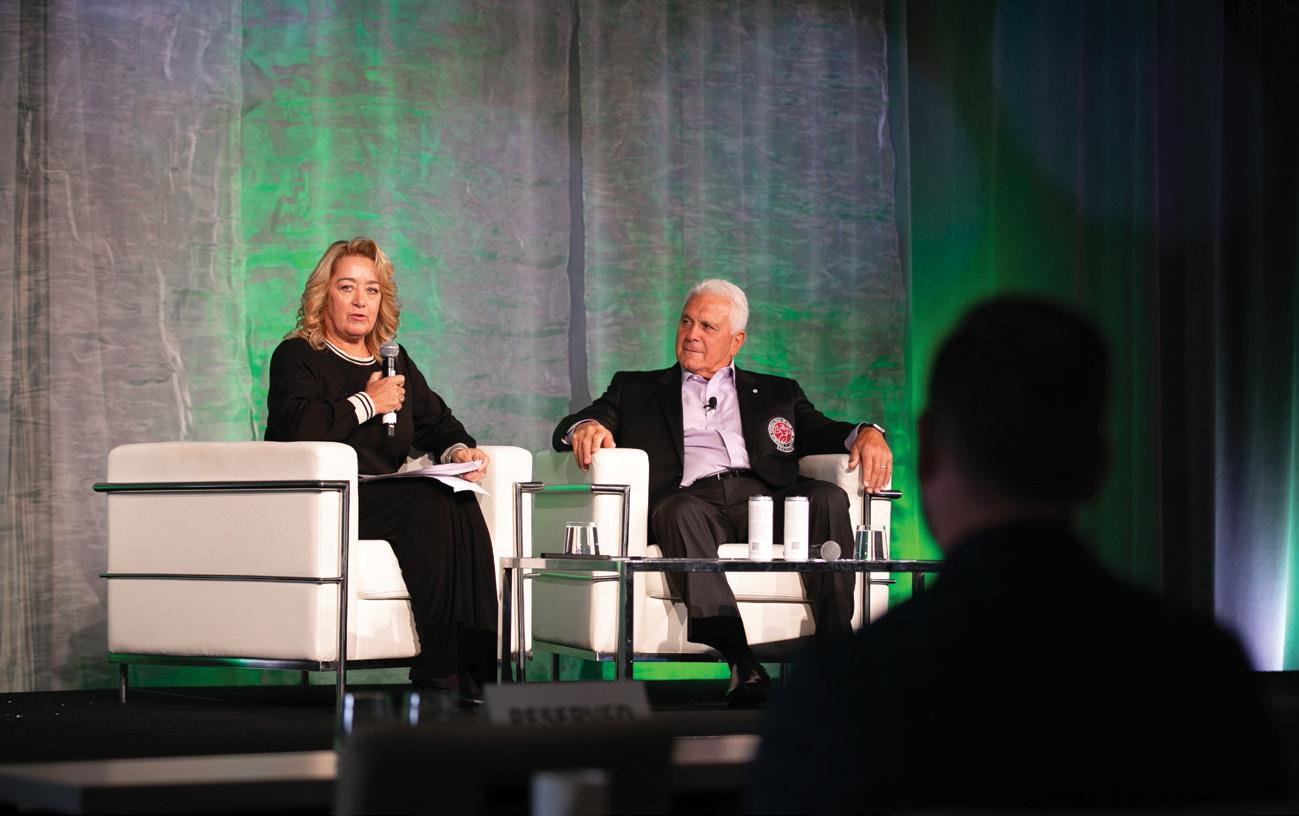
The Canadian Mortgage Brokers Association – British Columbia delivered an impactful industry event with the All Stars Conference and Trade Show held on April 15 and 16 at the prestigious JW Marriott Parq in Vancouver.
Gathering mortgage professionals from across the province and beyond, the conference unfolded as a nexus of insight, inspiration and networking, illuminating key trends and strategies vital for success in today's dynamic mortgage landscape.
Kicking off the event was a keynote address by Dr. Robyne HanleyDafoe, shedding light on the indispensable role of resilience, emotional support and self-care in navigating life's challenges. Dr. Hanley-Dafoe's poignant insights resonated deeply with attendees, emphasizing the importance of cultivating social connections and a sense of belonging as pillars of resilience in the face of adversity. Her empowering message set a tone of determination and possibility, ending with the resounding message: “We can do great things.”
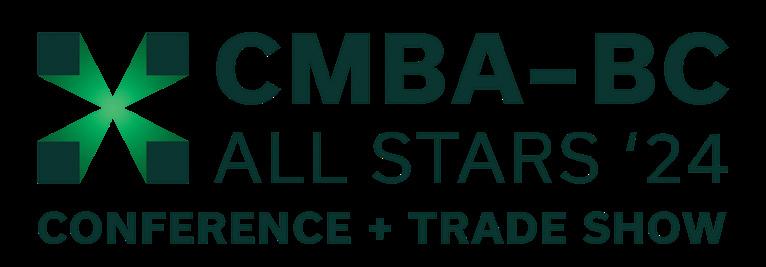
Following the keynote, a panel of respected mortgage brokers shared their personal journeys of resilience and triumph, offering invaluable lessons gleaned from overcoming obstacles in their professional paths.
Kyle Green, of the Green Mortgage Team, took centre stage to dissect the perennial debate between fixed and variable mortgage rates, providing attendees with a comprehensive overview of the current landscape and equipping them with actionable insights to navigate this crucial decision point.
Regulatory updates took the spotlight as the British Columbia Financial Services Authority shed light on the impending implementation of the new Mortgage Services Act (MSA) in B. C., arming brokers with essential knowledge to navigate regulatory shifts and uphold industry standards.
The conference delved deep into the realms of B-lending and mortgage investment corporations (MICs), offering unparalleled insights into these burgeoning sectors amidst evolving regulatory frameworks and mounting affordability challenges. Executives from B-lending and MIC spheres
Top row, from left across both pages: Dr. Robyne Hanley-Dafoe was a keynote speaker with her presentation: Mastering Life with Work Integration for Optimal Performance and Wellness; Lee-Anne McEllister received the MB Community Service Recognition Award presented by Leighton Watson from Pineapple National Inc; Courtney Sanh and May Einarson enjoy the keynote presentation.




convened to highlight the complexities and opportunities inherent in their domains, empowering brokers with strategic acumen to serve diverse borrower needs effectively.
Day two of the conference saw the indomitable Wally Buono, revered as the godfather of the Canadian Football League, imparting invaluable lessons in leadership and team dynamics, drawing striking parallels between sports and business success. His address underscored the significance of fostering a championship mindset and cultivating high-performing teams as catalysts for enduring success in competitive arenas.
The agenda continued to unfold with sessions dedicated to marketing strategies tailored for mortgage professionals, emphasizing the imperative of innovation and differentiation in a crowded marketplace. Jill Moellering's workshop on mastering the transfer and switch game offered practical strategies to bolster client retention and business growth.
Amidst the day’s actvities, attendees gathered for the prestigious MB Awards presentation during lunch. Celebrating excellence and innovation
in the mortgage brokerage realm, the awards ceremony was a poignant reminder of the industry's collective achievements and aspirations for the future. Among this year’s recipients, Ajay Soni received the prestigious Pioneer Award.
Brendon Ogmundson, chief economist of the BC Real Estate Association, provided attendees with a nuanced understanding of market dynamics and emerging trends shaping the mortgage landscape.
The conference culminated in a lively lender panel featuring leaders of the lending industry. Executives from leading institutions convened to dissect market dynamics and predict future trends, offering attendees unparalleled insights into the pulse of the mortgage market.
In essence, the All Stars Conference and Trade Show of 2024 emerged as a beacon of inspiration and empowerment for mortgage professionals, equipping them with the knowledge, strategies and connections essential for navigating challenges and seizing opportunities in an ever-evolving industry landscape.
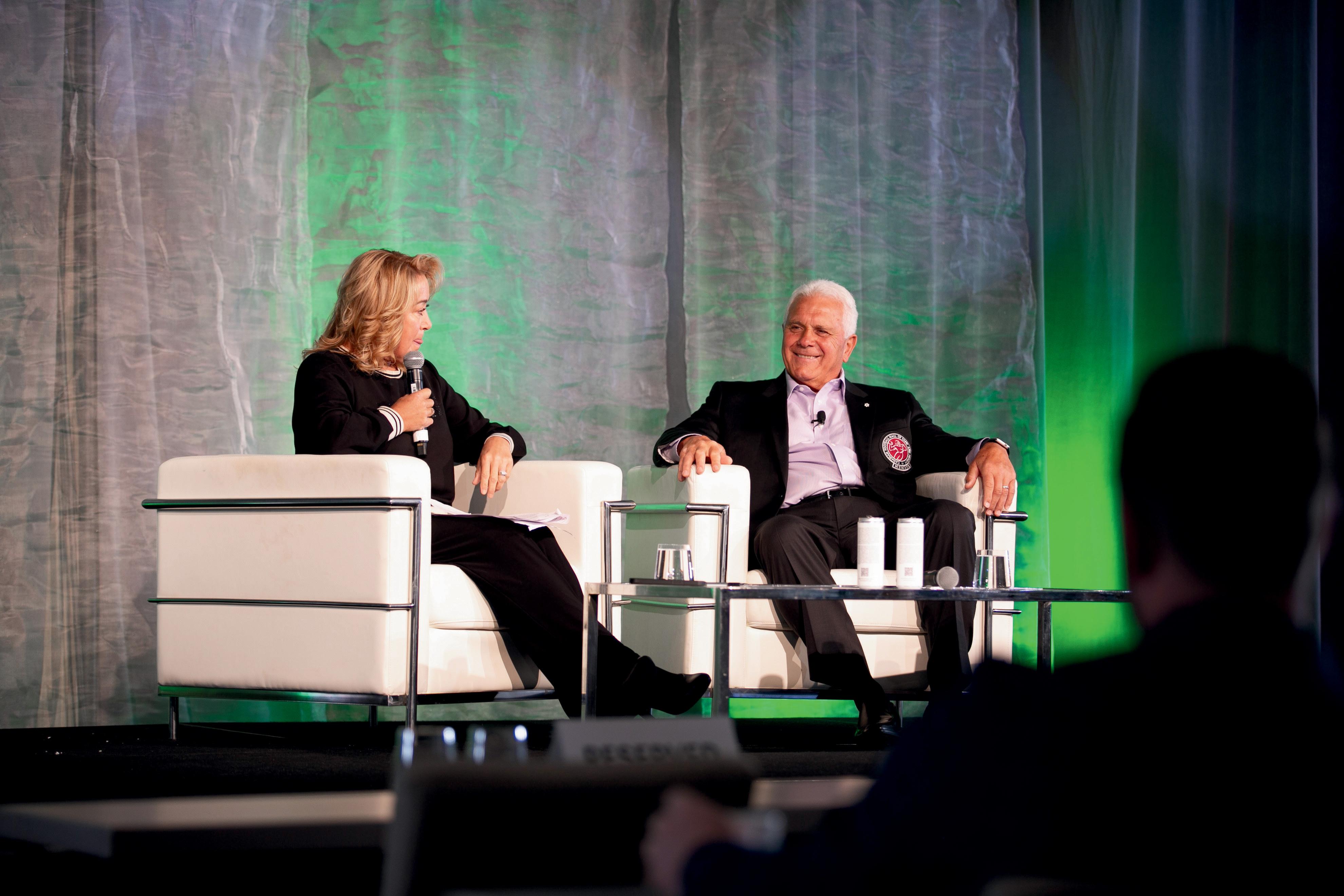
We've achieved our donation goal, but we encourage supporting the Make-A-Wish Foundation!


Join our keynote speaker Wally Buono in spreading joy! SCAN TO DONATE Support Make-A-Wish Foundation and be part of making dreams come true.
Connect & Grow: Network with peers and industry experts. Expand your horizons and cultivate valuable connections that will propel your career forward.
Elevate Your Expertise: Access industry courses and webinars designed to sharpen your skills and keep you ahead of the curve in an ever-evolving market.
Access Exclusive Resources: Explore a range of tailored resources and benefits to support your growth and success.
Join us as we champion the interests of mortgage brokers on both local and national levels.
Become a member of your CMBA provincial associations in BC, Ontario, Quebec, and the Atlantic region, and seize the opportunity to empower your growth!
Ready to thrive in the mortgage industry? Join us today!

The Mortgage Brokers Act (MBA) will be repealed and replaced with the Mortgage Services Act (MSA) upon cabinet passing the appropriate regulation. At present cabinet is awaiting for other regulations and rules to be in place before it takes this step.
British Columbia Financial Service Authority (BCFSA), the regulating Crown Agency, established a technical working group (TWG) to facilitate the implementation of the MSA. CMBA-BC, represented by CEO Carla Giles and President Marci Deane, is part of the TWG as contributing members. The TWG’s objective is to gather external stakeholder input on proposed implementation strategies regarding transitioning the mortgage broker segment of the MBA to the new regulatory framework of the MSA. Feedback received will aid BCFSA in identifying challenges, unintended consequences, and facilitating effective
change management during the transition to the MSA. BCFSA’s role does not extend to the development of regulations and rules under the MSA, as this falls under the jurisdiction of the B.C. Ministry of Finance. Consequently, feedback on regulatory content is beyond the scope of the TWG’s mandate.
Given the time required to develop rules and regulations, the Minister of Finance initially stated that the earliest the MSA would be brought into force would be in the autumn of 2023, it now appears that even sometime in 2024 might be overly optimistic. Once brought into force, the MSA will govern the providing of mortgage services. CMBA-BC will be providing practical educations to brokers and managers as the transition progresses.
Following are some of the highlights of the MSA. As they are in summary form, the MSA should be consulted where specific wording is important.
The MSA creates a new position, the Superintendent of Mortgage Services (“the superintendent”). The superintendent is appointed by the BCFSA board of directors and is authorized to exercise the powers and required to perform the duties of the position. The superintendent position under the MSA in effect replaces the registrar position under the MBA.
Any person carrying on the business of providing mortgage services, unless coming within the exemptions, is required to obtain a license under the MSA. Providing mortgage services means to deal in mortgages, trade in mortgages, mortgage lend, or administer mortgages.
You are dealing in mortgages if you perform any of the following activities or hold yourself out as doing so:
n soliciting another person to borrow or lend money on the security of real property
n providing advice to a prospective borrower or lender about entering into a particular mortgage contract
n providing information about a prospective borrower to a prospective lender of a mortgage, whether or not the lender is subject to the MSA
n assessing a prospective borrower on behalf of a prospective lender of a mortgage, whether or not the lender is subject to the MSA
n negotiating or arranging, or attempting to negotiate or arrange, a mortgage on behalf of another person
n any other prescribed activities
You are trading in mortgages if you perform any of the following activities or hold yourself out as doing so:
n soliciting another person to buy, sell or exchange mortgages
n buying, selling, or exchanging mortgages on behalf of another person
n buying, selling, or exchanging mortgages on the person's own behalf
n any other prescribed activities
You are mortgage lending if you perform any of the following activities or hold yourself out as doing so:
n lending money on the security of real property
n any other prescribed activities
You are administering mortgages if you perform any of the following activities or
hold yourself out as doing so:
n receiving from a borrower payments under a mortgage and remitting those payments
n monitoring the performance of a borrower with respect to the borrower's obligations under a mortgage
n enforcing or taking steps to enforce payment by a borrower under a mortgage
n any other prescribed activities
The MSA applies to persons, with persons being defined to include an individual; a corporation; a partnership, trust or fund; an association, syndicate, organization, or other organized group of persons; and an individual or other person in that person's capacity as a trustee, executor, administrator or personal or other legal representative. Note that individuals are but one part of the definition of persons for purposes of the MSA.
The MSA distinguishes between mortgage brokers and mortgage brokerages. A mortgage broker is an individual and a mortgage brokerage is a person.
An individual is not permitted to provide mortgage services for direct or indirect remuneration, as an employee or otherwise, unless licensed as a principal broker or mortgage broker to provide those mortgage services and acting on behalf of a mortgage brokerage.
A person is not permitted to provide mortgage lending unless the person is licensed as a mortgage lender; licensed as a mortgage brokerage to carry on the business of providing that mortgage service; licensed as a principal broker or mortgage broker to provide that mortgage service and is acting on behalf of a mortgage brokerage.
Specified entities and individuals (primarily those already subject to federal or provincial regulation, such as banks and credit unions and their employees) are exempt from having to be licensed under the MSA.
The MSA establishes four licence levels. A mortgage brokerage licence authorizes a




mortgage brokerage to carry on the business of providing mortgage services through a principal broker or mortgage broker. A principal broker licence authorizes a principal broker to act for a mortgage brokerage for all purposes under the MSA. A mortgage broker licence authorizes a mortgage broker to provide mortgage services under the supervision of a principal broker. A mortgage lender licence authorizes a mortgage lender to provide the mortgage service of mortgage lending.
While individuals can be licensed at any of the four levels, a person who is not an individual can be licensed only as a mortgage brokerage or mortgage lender.
Once established, the rules may provide for categories of registration within one or more of these levels. If they do, a person may be licensed within a category.
A mortgage brokerage will be required to have a mortgage brokerage licence for each of its branch offices from which it operates unless the rules provide otherwise.
An applicant for a new mortgage brokerage licence, principal broker licence, or mortgage broker licence or for the renewal of one of those licences must satisfy the superintendent that they meet the following applicable requirements:
n they are of good reputation and suitable to hold the applied for licence
n where an individual is applying for a new licence, they are at least 19 years of age and meet the educational and experience requirements established by the rules
n where an individual is applying for a licence renewal, they meet the education requirements specified by the superintendent
n where an applicant is not an individual, the following individuals, as applicable, are of good reputation: if the applicant is a partnership or corporation, the applicant’s partners or directors and officers; if a partner of the applicant is a corporation, the corporation’s directors and officers; and if the applicant is not a partnership or corporation, the individuals who directly or indirectly control the applicant
n in all cases, the applicant has not, for a reason that reveals the applicant as unfit to be a licensee: been refused a licence under mortgage services, real estate, insurance or securities legislation in B.C. or another jurisdiction; held a licence that was suspended or cancelled under mortgage services, real estate, insurance or securities legislation in B.C. or another jurisdiction; been disciplined by a professional body; or been convicted of an offence n in all cases, the applicant meets any other qualification requirements established by the rules
An applicant for a new mortgage lender licence or for the renewal of such a licence must satisfy the

superintendent that the applicant meets the qualification requirements established by the rules.
A mortgage brokerage is required to have at least one principal broker licensed in relation to it and is limited to providing only those mortgage services permitted by the principal broker’s licence. The principal broker acts for the mortgage brokerage for all purposes under the MSA and is responsible for the exercise of the rights conferred on the mortgage brokerage by its licence; the performance of the duties imposed on the mortgage brokerage by its licence; and the control and conduct of the mortgage brokerage's mortgage business, including supervision of the mortgage brokers who are licensed in relation to the mortgage brokerage.
An individual who is licensed as a mortgage brokerage and qualified to be licensed as a principal broker is deemed to be licensed as a principal broker in relation to the mortgage brokerage unless their application in relation to the mortgage brokerage licence indicates that the individual will not be acting in that capacity.
A principal or mortgage broker is permitted to be licensed in relation to only a single mortgage brokerage and must be engaged by that mortgage brokerage. If the rules permit, a principal broker may be licensed in relation to more than one mortgage brokerage if the mortgage brokerages are affiliated within the meaning of the rules.
A principal broker or mortgage broker is permitted to provide mortgage services on behalf of only the mortgage broker in relation to which they are licensed and cannot accept remuneration for mortgage services from any person except that mortgage brokerage.
A mortgage brokerage is prohibited from providing mortgage services except by a principal broker or mortgage broker licenced to and engaged by the mortgage brokerage. A mortgage broker must not engage or allow a licensee to provide mortgage services on behalf of the mortgage brokerage if the licensee is licensed in relation to another mortgage brokerage, except if the principal broker is licensed to and engaged by both mortgage brokerages.
To be engaged in relation to a mortgage brokerage mean to be either:
n employed by the mortgage brokerage to provide mortgage services on its behalf, or
n acting in an independent contractor relationship with the mortgage brokerage to provide mortgage services on its behalf.


A mortgage brokerage is required to ensure that the following individuals do not train or supervise principal brokers and mortgage brokers who are licensed in relation to the mortgage brokerage, unless the individual is licensed in relation to that mortgage brokerage: a partner, or a director, officer or shareholder of a corporation that is a partner, in the case of a mortgage brokerage that is a partnership; a director, officer or shareholder of the corporation, in the case of a mortgage brokerage that is a corporation; a sole proprietor, in the case of a sole proprietorship; an individual who directly or indirectly controls the mortgage brokerage, in any other case.
A licensee must act fairly, honestly and in good faith when providing mortgage services.
A mortgage brokerage must maintain proper books, accounts, and other records in accordance with the rules and must keep those records in British Columbia.
A licensee must not maintain a trust account unless authorized by the superintendent. A trust account must be with one or more savings institution in BC, be maintained in accordance with the rules, and must be designated as a trust account both in record of the licensee and the savings institution.
A licensee, or an unlicensed and not exempted person providing mortgage services, must not misappropriate or convert money or other property received in relation to mortgage services or intentionally fail to account for or pay over the same within a reasonable time to the person to whom it belongs.
A licensee, or an unlicensed and not exempted person providing mortgage services must not: make an intentional misrepresentation; deceive another person about the nature of the mortgage services; make a representation or engage in any conduct that has the capability, tendency or effect of deceiving or misleading another person in relation to mortgage services; or make a promise or representation about the future that is beyond reasonable expectation and not made in good faith.
Not surprisingly, specific matters such as the following amount to misconduct: contravening the MSA the regulations or the rules; breaching a restriction or condition of the licence; demonstrating incompetence; failing or refusing to cooperate with an investigation; failing to comply with an order of the superintendent; failing to comply with an undertaking; making or allowing a false or misleading statement in a required record.
It is conduct unbecoming for a licensee to engage in conduct, that in the judgment of the superintendent

is contrary to the public interest, undermines public confidence in the mortgage industry, or brings the mortgage industry into disrepute.
Where the licensee is not an individual the above prohibitions as to misconduct and conduct unbecoming apply to (as the case may be) partners, officers, directors, controlling shareholders, and individuals who directly or indirectly control the licensee.
Discipline penalties can include one or more of the following: a reprimand; a licence suspension, cancellation, or restriction; an order to cease or carry out specified activity; a requirement to complete certain education and/or training; a prohibition from applying for a licence in the future; a requirement to pay enforcement expenses; a requirement to pay not more than $500,000, in the case of a mortgage brokerage or former mortgage brokerage and not more than $250 000, in any other case; and a requirement to pay the amount of any remuneration received for the mortgage services in respect of which the contravention occurred.
A person who provided unlicensed mortgage services is subject to those of the penalties listed in the above paragraph that could be applicable.
BCFSA can designate contraventions of specified provisions of the MSA, the regulations or the rules as being subject to administrative penalties. As well, it can establish the amount or range of amounts of administrative penalty that may be imposed with the maximum being $100,000.
The MSA provides for various offenses, encompassing matters such as licensing, deceptive practices, hindering investigations, disobeying orders from the superintendent, providing false or misleading information required under the MSA, and breaching regulations.
Penalties for committing an offence can be up to $1.25 million for a first offence and up to $2.5 million for subsequent offences. An individual, as opposed to a corporation, convicted of an offence is subject as well to imprisonment for up to two years.
The MSA provides the BCFSA with rule-making authority as to both licensing and licensee conduct. Before making, amending, or repealing a rule, the BCFSA must publish the proposed rule for public comment in accordance where the regulations require doing so, obtain the consent of the minister in accordance with the regulations; and comply with any other prescribed procedures and requirements.
Any person’s failure to obtain a license does not in itself make a mortgage void or unenforceable. However, a person who is neither licensed as required nor exempted cannot sue to be paid for having provided unlicensed mortgage services.
The failure to provide or a defect, omission or irregularity in a required disclosure or information statement does not in itself make a mortgage void or unenforceable. However, unless the licensee provides the required information statement, a lender or purchase of a lender interest is not obligated to advance the mortgage funds.
BCFSA is authorized to make rules it considers necessary or advisable concerning errors and omissions insurance to be maintained by licensees.
BCFSA and the superintendent are authorized to each enter into an agreement with a regulatory authority of another jurisdiction inside or outside of Canada, respecting the administration and enforcement of the MSA or of comparable legislation of the other jurisdiction. Such an agreement may provide for the provision and exchange of information between the relevant jurisdictions.
It is likely that the MSA as new legislation will better address the contemporary mortgage industry. It is highly unlikely that it will come without any unexpected outcomes.
As well, the MSA in effect delegates much of its current power to BCFSA and to the superintendent, both of which have the ability to address matters with greater speed than could the legislature or even cabinet. However, this concentration of power in fewer hands also lends itself to the possibility of a lesser range of voices, perspectives, and concerns being considered in determining future regulatory decisions. The body that investigates, issues notices of hearings, ‘prosecutes’, adjudicates, and enforces mortgage services matters will have more say in establishing regulatory requirements. As the old cliché states, “with great power comes great responsibility”. One can hope that this power is exercised transparently and with continuing consultation with the industry.



No mortgage stress test. Oh, the places your clients can go!
While most lenders have to qualify clients with the stress test, we don’t. We qualify at contract rate, so your clients may be approved for a higher mortgage with us.


The federal government’s Budget 2024, released on April 16, 2024, contains a number of initiatives and legislative reforms aimed at combatting financial crime in Canada, including terrorist financing, corruption, sanctions evasion, tax evasion, money laundering, and fraud. The Budget promises changes to Canada’s anti-money laundering and antiterrorist-financing (AML/ATF), criminal, and tax regimes to create additional powers, efficiencies and incentives relating to compliance and enforcement, as well as the creation of new specialized units specifically tasked with complex financial crime.
The 2024 Budget introduces a number of amendments to the Proceeds of Crime (Money Laundering) and Terrorist Financing Act (PCMLTFA), Canada’s principal anti-money laundering legislation. Following developments such as the Panama Papers and FinCEN Files data leaks in recent years, as well the June 2022 findings of the Government of British Columbia’s Commission of Inquiry into Money Laundering in British Columbia (also known as the Cullen Commission), money laundering has increasingly been seen as a significant issue in Canada.
Consistent with this, the government has previously introduced a number of compliance reforms including establishment of a publicly accessible beneficial ownership registry (with the reporting obligations for federal corporation recently becoming effective in January 2024) and various amendments to the PCMLTFA. Those changes – discussed in further detail in our Legal Outlook 2023 articles on white-collar enforcement and financial services regulatory trends – have included, among others: n improved information sharing between law enforcement and the Canada Revenue Agency (CRA), and Financial Transactions and Reports Analysis Centre of Canada (FINTRAC)
whistleblower protections for employees who report information to FINTRAC prohibiting money services businesses (MSBs) from engaging with agents or mandataries convicted of certain offences a new offence for structuring financial transactions to avoid FINTRAC reporting new regulations requiring the mortgage sector to comply with new AML/ATF obligations
Since June 2023, the Department of Finance and FINTRAC have been engaged in a public consultation to strengthen Canada’s AML/ATF regime, seeking input regarding risks and vulnerabilities emerging in light of new financial technologies and in respect to national security risks. This consultation was concluded in August 2023.
Following this consultation, the 2024 Budget proposes a number of additional amendments to the PCMLTFA. Proposed amendments include the following:
n enhancing information-sharing abilities between reporting entities to detect and deter financial crime while maintaining privacy protections for personal information, including an oversight role for the Office of the Privacy Commissioner under regulations n permitting FINTRAC to disclose financial intelligence to provincial and territorial civil forfeiture offices to support efforts to seize property linked to unlawful activity, and Immigration, Refugees and Citizenship Canada to strengthen the integrity of Canada’s citizenship process
n enabling AML/ATF regulatory obligations to cover factoring companies, cheque-cashing businesses, and leasing and finance companies
n allowing FINTRAC to publish more information about violations of reporting obligations and resulting administrative penalties to strengthen transparency and incentivize compliance
n making technical amendments to close loopholes and correct inconsistencies
The exact form of these amendments has yet to be announced.
The 2024 Budget also included various proposed amendments to the Criminal Code aimed at combating money laundering, terrorist financing, sanctions evasion and other forms of economic crime. Specifically, the Budget introduces proposed amendments granting additional judicial powers to allow courts to n make orders requiring financial institutions to keep accounts open for the purpose of assisting in the investigation of suspected criminal offences n issue repeating production orders authorizing law enforcement to obtain ongoing, specified information or account activity connected to persons of interest in criminal investigations
These new proposals follow amendments to the Criminal Code introduced last year which gave law enforcement the ability to freeze and seize virtual assets with suspected links to crime (through a special warrant obtained pursuant to the new section 462.321 of the Criminal Code), as proposed under the 2023 Budget.
Additionally, the 2024 Budget includes proposed amendments to the Income Tax Act and Excise Tax Act authorizing Canada revenue Agency officials to seek general warrants through court applications.
In 2022, the federal government announced its intention to establish a new Canada Financial Crimes Agency (CFCA) to act as Canada’s lead enforcement agency against financial crime. As currently envisioned, the CFCA will act as a nation-wide agency whose sole purpose is to investigate highly complex crimes and enforce federal law in this area and would bring together existing law enforcement
resources of the RCMP, intelligence capabilities of FINTRAC, and expertise of the Canada Revenue Agency. The 2024 Budget allocates $1.7 million over two years to the Department of Finance to finalize the design and legal framework of the CFCA.
The proposed establishment of the CFCA reflects an ongoing trend of specialized enforcement agencies or units dedicated to investigating and enforcing complex financial crimes, following criticism of Canada’s perceived lack of enforcement. In 2020, the federal government announced the establishment of the new Integrated Money Laundering Investigative Teams in British Columbia, Alberta, Ontario, and Quebec, which seek to bring together expertise from a variety of agencies to assist the RCMP in addressing high-profile cases and advancing money laundering and proceeds of crime investigations nationwide. This follows the establishment of other agencies such as the Canadian Ombudsman for Responsible Enterprise (which reviews ethics and human rights complaints) and provincial agencies such as Quebec’s Unité permanente anticorruption. It remains to be seen what impact the proposed CFCA, and other recently established enforcement agencies, will have on Canada’s perceived lackluster enforcement record.
Finally, the 2024 Budget highlights “trade-based” financial crime as one of the most pervasive means of laundering money, through which an estimated hundreds of millions are laundered each year. As described by Public Safety Canada, trade-based money laundering is the process of disguising proceeds of crime and other illicit financial flows as legitimate international trade transactions. The federal government has previously
Since June 2023, the Department of Finance and FINTRAC have been engaged in a public consultation to strengthen Canada’s AML/ ATF regime, seeking input regarding risks and vulnerabilities emerging in light of new financial technologies and in respect to national security risks. This consultation was concluded in August 2023.
announced in its 2023 Fall Economic Statement several proposed enhancements to the Canada Border Services Agency’s (CBSA) powers under the PCMLTFA, a well as the creation of a “Trade Transparency Unit” to detect, deter, and disrupt trade-based financial crime. The 2024 Budget proposes to provide $29.9 million over five years for the CBSA to support the implementation of its new authorities under the PCMLTFA to combat financial crime and strengthen efforts to combat international financial crime.
The initiatives set out in the 2024 Budget continue a trend in recent years of legislative reforms and additional enforcement developments for complex financial crime. While it remains to be seen how effective these additional measures will be, they are reflective of a regulatory and business environment in which companies are increasingly asked to demonstrate their commitment to compliance and acting ethically in the course of business. As always, organizations should apply best practices to manage AML/ATF and other financial crime risks. As the landscape continues to shift in Canada, remaining vigilant and ensuring policies are updated and revisited to ensure their compliance with all AML/ATF laws and regulations is key. Businesses should also anticipate increased coordination with provinces and territories as they begin to make legislative, regulatory and enforcement changes to respond accordingly within their own jurisdiction.
This article was first published by Osler (osler.com). Osler is a leading business law firm practising from offices across Canada and in New York. Malcolm Aboud is Counsel, Litigation (Government Investigations and WhiteCollar Defence) and Emilie Dillon is Associate, Litigation.


